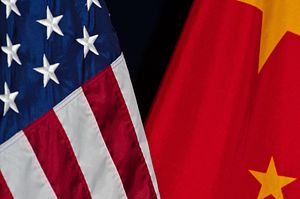There is much to admire in Salvatore Babones’s short book American Tianxia. It is a welcome corrective to the often-unchallenged conventional wisdom that the 21st century belongs to a rising China that is fast overtaking U.S. global predominance.
Tianxia, Babones explains, has existed as a concept throughout Chinese history. It operates on three levels:
(1) the earth or all lands under the sky … (2) a common or public choice made by all peoples in the world, truly representing the general will … and (3) a universal political system for the world.
China’s leaders clearly view China as the center of the Asian political system, and some foresee China as the center of the emerging world-system, replacing the United States in that role.
Babones uses facts and trends — economic, military, and political — to deflate this notion. The U.S., he notes, still leads all large economies in GDP per capita. (China’s GDP per capita, he notes, is only one-sixth of the United States’). The dollar continues to be the world’s central currency. Money and talent from all over the world continue to flow into the United States. The U.S. military remains the most powerful in the world. Most important for Babones, the American Tianxia “promotes the interests of individuals” and universal moral values (rule of law, democracy, and human rights).
The author downplays the significance of China’s geopolitical moves in Central Asia, Africa, the Indian Ocean, and the East China and South China Seas. One chapter of the book is entitled “One Belt, One Road to Nowhere.”
He points to China’s recent economic slowdown, its emigration rates among its most wealthy, skilled, and educated citizens, and its long-term demographic problems as symptoms of a country whose “rise” may be ending in relative terms. China, he predicts, “will recede as a conceivable global challenger [to the U.S.] by mid-century.”
Babones dismisses Sir Halford Mackinder’s warnings about an Asian-based great power seeking hegemony over the Eurasian-African “World Island” as last century’s geopolitics because it is state-based, whereas the American Tianxia appeals to individuals throughout the world. “Only a state founded on the primacy of the individual and ideologically committed to freedom of opportunity for all individuals,” Babones asserts, “could succeed as the central state of a truly global world-system.”
One does not have to believe in the inevitability of conflict between China and the United States, or accept the currently fashionable notion of the “Thucydides Trap,” to be a little more sanguine than Babones is about the possibility of great power conflict in the 21st century. The North Korean nuclear and missile programs, China’s aggressive moves in its adjacent seas, and the status of Taiwan all remain potential flashpoints for great power conflict in East Asia and the Western Pacific. Meanwhile, Russia and Iran continue to stir up trouble in Eastern Europe and the Middle East, causing concern among U.S. and European statesmen.
Babones’s conclusion — that an American-led “world system” has “neutered the nation-state,” replaced the “anarchic interstate system,” and “successfully disaggregated the world into individuals,” resulting in a more peaceful, more open, and more orderly world — is more definitive than it would prudent to accept.
History, contrary to Babones, has not taken a hiatus. Nation-states still matter and their leaders still mostly pursue national rather than individual interests. As Mackinder warned nearly 100 years ago, “He would be a sanguine man … who would trust the future peace of the world to a change in the mentality of any nation.”
This piece was originally published by Asian Review of Books. The original piece appears here.
Francis P Sempa is the author of Geopolitics: From the Cold War to the 21st Century and America’s Global Role: Essays and Reviews on National Security, Geopolitics and War. His writings appear in The Diplomat, Joint Force Quarterly, the University Bookman and other publications. He is an attorney, an adjunct professor of political science at Wilkes University, and a contributing editor to American Diplomacy.

































